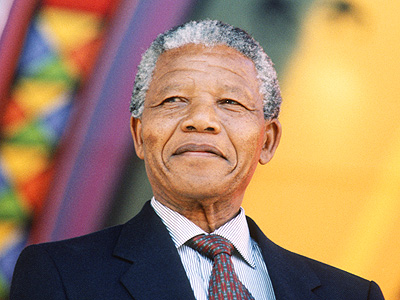South Africa Express |
||
Online-Zeitungfeaturing Nelson Mandela |
11.02.2015 | |
Nelson Mandela - his early years
 Nelsons M. as a child
Nelsons M. as a child Rolihlahla "Nelson" Mandela was born on the 18th of July 1918 in Qunu, South Africa. As the youngest son of a respected African chief Nelson was offered the opportunity to go to school. There he was named Nelson by one of his teachers. Mandela studied at the University of Fort Hare as well as the University of Witwatersrand. Finally, he graduated in law, setting up a law practice in Johannesburg with his friend Walter Sisulu. It was the injustice he was confronted with at work, that began to influence him. |
South Africa´s unrestlessness
South Africa´s change after the dead of Nelson Mandela
 Nelson Mandela after he was freed
Nelson Mandela after he was freed The chipped president Jacob Zuma got booed by his own compatriots at the funeral of Nelson Mandela, because the South Africans saw that he didn't`t reach the goals they wanted him to reach. That's why many people see in Cyril Ramaphosa the future of South Africa, although the fact that he is one of the ANC-multimillionaires deters many of the simple people. If Jacob Zuma was dissuaded from re-candidate, then Ramaphosa`s time would come. One of Ramaphosa`s goals is the great social and reconciliation project of South Africa, the Rainbow Nation. But South Africa does not only consist of Zuma and Ramaphosa which was visible at the funeral of Mandela, where a whole nation was united. Furthermore, the ANC got more election losses from election to election, which shows a similar tendency. This is the essence of democracy, Mandela was ready to die for. |
 Nelson Mandela at his famous speech
Nelson Mandela at his famous speech
Soon after Mandela ran away from home, because he was cheated by his family, he became actively involved in the anti-apartheid movement. A few days later he joined the ANC (African National Congress). This was in 1942. At that time the ANC was a small group of young Africans who where interested in transforming the ANC into a threat for the white government. Their goal was to become stronger with the help of peasants and working people who didn`t have a voice under the former regime. Unfortunately, these people believed that the ANC`s old tactics of polite petitioning were ineffective. That's why the ANC concentrated on adopting many laws like the right to boycott, strike, civil disobedience and non-cooperation.
First Mandela was against this kind of conviction, but he changed his mind when he saw the success the ANC could prescribe. Finally he was detained for planning a violent demonstration. Nevertheless, the former president Peter Willem Botha offered Mandela and some other political prisoners freedom with the condition to renounce any kind of violence. Mandela refused the offer with the reason that he could only stop acting violent when the government would also stop it. He proposed agreements, not war.
The new president Frederik William de Klerk arranged that all political prisoners would be released in the year 1990. Moreover, he "unbanned" the ANC as well as more than 30 other political organisations. After intensive negotiations about the future of South Africa the new government found a compromise, a transitional constitution, which established the participation of all races in the government, for a limited time. For this courage de Klerk and Mandela received a Nobel Peace Prize. In April 1994, the first democratic elections where all South Africans could take part in were finally conducted.
Mandela joined the African National Congress (ANC) in 1944. He was one of the founders of the ANC Youth League, which he leaded between 1951/52. In that time the ANC organized a mass protest against the white dominance in Africa. This dominance was the result of the separation between the black and white population, which caused social and economical disadvantages. Nonviolent civil disobedience planned by the ANC was the reason why Mandela got a probation penalty for 9 month. Moreover. he was sentenced to house detention and to a ban from all political activities. That's the reason why Mandela was hiding in the underground until his arrest.
 Newspaper article about Nelson Mandela
Newspaper article about Nelson Mandela
 Lade Seiteninhalt...
Lade Seiteninhalt...

